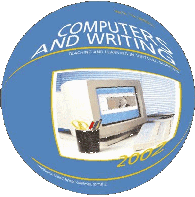Dene Grigar – "Medium and Texts"
It is increasingly becoming impossible for an author of a print text about
composition (or even literature) to avoid discussion about or
implementation of computers and/or computer-mediated writing in their
texts.
A couple of recent occurrences lead me to this conclusion.
First, I was recently asked to write a short discussion about composing in
MOOs for a prominent writing handbook, one that has been in print for
decades. The author had not originally included a section on writing for
computer media in the new edition but was asked by the publisher to
include it.
Second, for the last two years I have been authoring web companions for
literature textbooks. Web companions, websites that offer additional
materials such as author biographies, online criticism, and additional
activities to a print-based textbook, are free with the purchase of the
textbook but are seen as adding "value" to the print text. Thus, more and
more traditional texts are being augmented by electronic media.
From the viewpoint of student writing this means that writing
electronically for various media is becoming more and more prominent and
is in a sense, expected of them. It also exposes them to kinds of
electronic writing that they themselves may be interested in
exploring. If they see, for example, course work delivered in a MOO as my
class materials are, then they may become interested in learning the ins
and outs of writing in that environment as some of my students have.
I should say that all of my courses, including the undergraduate course,
Advanced Composition and Grammar, and graduate courses, such as Feminist
Rhetoric, are taught in a web-based MOO. Students learn to write into
existence the tools like Notes, Webslides, MOOslides, Recorders, and
Lectures and themselves and their ideas via weekly online discussions and
descriptions of themselves and their objects. While BlackBoard is the
tool of choice at TWU and are used for most courses on and offline, I have
turned instead to MOOs because of the need for writing that this
environment requires.
Although writing more does not lead to writing well, giving students
experience in various media and with different rhetorical situations
challenges them to think more broadly about the purpose of writing. In
many cases, just getting students to realize this truth is half the
battle.
The medium we use to teach students how to write can have great influence
in the way they make sense of the texts they read and texts they
themselves write.


